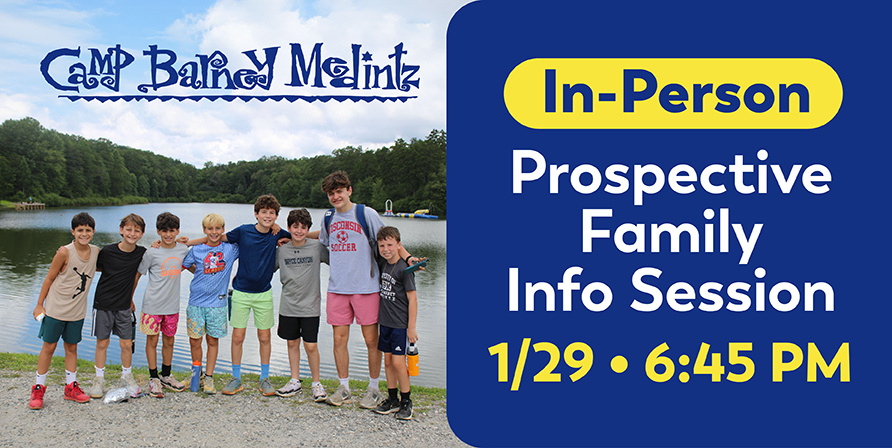Adjustment To Camp
Upon arrival at Camp Barney Medintz, it is common for all campers, new and returning, to require some adjustment. Some campers may immediately become homesick and might express these feelings in the first or second letter home to you. In fact, homesickness is NORMAL! It’s often about being away from all that is familiar and suddenly encountering new places, new faces, new systems, and a change in routine. It’s common for adults, too!
Experienced campers may initially compare their first impressions to a previous counselor, camp, or fellow campers. Also NORMAL! Some kids adjust sooner than others, but generally, campers become truly comfortable when more and more about camp becomes familiar.
Our staff will be ready to respond to campers upon their arrival. Some kids need some quiet time at first with reduced instructions and stimuli, and some want to know everything right away! Still, others feel fine once they are connected with the counselor, campers in their cabin, the Health Center, cubby space, their bed, facilities, activities, and routines. That’s why the first letter home, especially if distressful, is often a very premature (and sometimes a very dramatic) reaction! Wait for the second letter home and call us if you’re still concerned.
Meanwhile, you may choose to build excitement and/or reduce anxiety by doing some pre-camp preparation. Express your confidence in your child’s ability to take care of themselves, knowing that asking for help is perfectly okay. Send along familiar items from home. Talk about the adventures awaiting your child, reuniting with old friends or making new ones, and which qualities your child possesses that other kids will be drawn to.
Talk to Your Camper About Homesickness
What is homesickness? We’ve probably all felt it at some point in our lives. It’s a natural, normal feeling that almost all children (and adults!) feel when they’re away from home. Those feelings just vary in intensity from one person to the next. According to the American Camp Association (ACA), “there are several factors that put children at greater risk for becoming homesick. For example, children with little previous experience away from home, children who have low expectations of camp, children who feel forced to go to camp, children who are unsure whether adults will help them if they need help, children who have little practice coping with negative emotions, and children whose parents express a lot of anxiety are most likely to feel homesick.”
Homesickness often passes quickly, but when it doesn’t, parents and camp staff partner together to give campers the support they need. Some parents fear that mentioning homesickness before camp begins will cause their child to be homesick. In fact, the opposite is true. Talking to your child about homesickness before they leave home is a great idea! It may even prevent homesickness before it starts. Have your child help pack for camp. Reassure them that camp is a fun and safe place, and that there are lots of adults on staff to help them if they are feeling sad. Remind them how confident you are in their abilities and independence, and please don’t promise them that you’ll come pick them up if they’re feeling homesick! If possible, have your child spend some “practice” time away from home, such as a long weekend at a friend or relative’s house. Try different coping strategies during this trial run.
The first letter or two that you receive from your camper may sound sad. Feelings of homesickness are often exaggerated during downtime (including rest hour, which is usually when campers write letters home). If you do receive such a letter, please start by taking a deep breath. We know it’s hard to imagine your child being sad and not being there to hug and comfort them. Remember that these feelings are natural and common and that our staff ARE there to hug and comfort your child. Also know that in the time that it took the letter to reach you, your camper may have adjusted to camp and the feelings expressed may no longer be accurate. Write your child back an encouraging letter, validating their feelings. Here are a few ideas of good things to say to a camper who is feeling homesick:
- Your feelings are normal
- I have confidence in you. I know you can do this.
- I know you feel miserable right now.
- I am not coming to pick you up early.
- Nothing fun or exciting is going on at home.
- The days will start going much faster once you’ve adjusted to camp.
- The more you participate and get involved, the better you will feel.
- Overcoming your homesickness will help you feel more confident about future adventures away from home.
- Even though it’s painful right now, I know that you are growing and maturing because of your camp experience.
- I’m really proud of you.
If you continue to be concerned, please contact us. We are happy to do some investigating and give you an update. We want to work together with you to make sure your child is happy and having the time of their life at camp.
